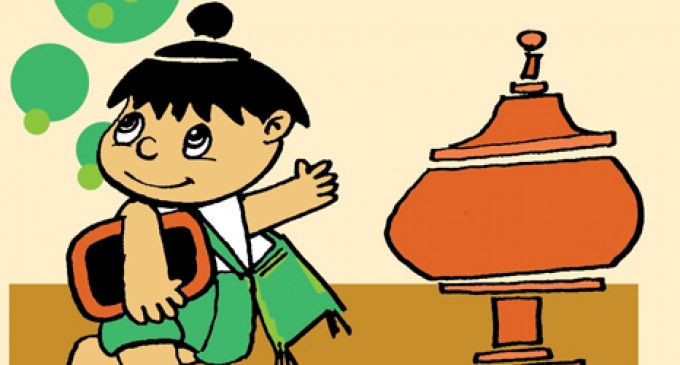Waso – Wagaung

You might be wondering what the title of this article means. Well, the two hyphenated words are Myanmar words. Waso is the fourth month and Wagaung the fifth month in the Myanmar calendar. The former coincides with June/July and the latter with July/August.
Waso-Wagaung is the period during which rainy season in Myanmar gains full force. It is, however, off tourist season here unfortun-ately—I mean unfortunately for ecotourists and tourists who come here in search of different cultures. For this period offers more than enough things to see and to experience in Myanmar—an agricultural country, mostly forested and rich in animal and plant life and 85% of whose people are Buddhists.
In Waso-Wagaung, all the creeks, streams, ponds, lakes and rivers are in flood. The days are almost always overcast, and when it rains— which is often— it rains cats and dogs. In the countryside, especially in Lower Myanmar covering the delta region, paddy fields are flooded with rain water, where a couple of months previously, in summer-hardened grounds, pwes and pagoda festivals were held, rustic youth played football and village children romped around. Now, water, water everywhere, with paddy dykes showing barely above water.
Village children, like children the world over, are never deterred one whit from playing. Though driven from the flooded paddy fields, they still play whatever games they’re playing in their village environment. Moreover, the rain and floods bring about changes in the rural environment, providing new things for the village children to play or be preoccupied with. For instance, the heavy pouring of rain brings down ripe coconuts and ripe luscious Eugenia from their trees. It is also an occasion for the children to take a welcome group-shower and sing to their heart’s content. This is characterized by a Myanmar pop refrain of yesteryear, supposed to be sung by a lisping kid, and shown with its English transliteration as follows:-
မိုးရြာရင္ ေရခ်ဳိးမယ္
ေမေမလာရင္ နို့ခ်ဳိ႕မယ္
ေဖေဖလာရင္ အုန္းသီးခြဲခ်ားမယ္
When it rains,
I’ll shower again!
When mummy comes,
I’ll suck mum’s milk!
When daddy comes,
He’ll hack open the coconut
for all of us to eat!
In the above Myanmar version, the underlined (csKd;) pronounced cho: (is Myanmar for shower), (csKdU) pronounced cho. a Myanmar child’s lisp of (pdkY) pronounced soe. (Myanmar for suck) and (csm;) pronounced cha: a child’s lisp of (pm;) pronounced sa: (Myanmar for eat)
Monsoon rain and resultant floods invariably bring with them water snakes, slithering in the mud or across the creeks, and slimy leeches and slugs lurking under thorny bushes. And—mind, if you’re not careful enough, a big slimy leech can enter your body through the anus without your knowing it. Ugh!
A vivid picture of two village children at play in a picturesque Waso-Wagaung setting is drawn in a few masterful strokes of the poetic brush by celebrated Myanmar poet, Minthuwun, in his poem entitled “Tha-byay-thee-kauk” (Coll-ecting Eugenia). Composed in dialogue between two village kids, the poem in Myanmar together with its English transliteration is given below:
၀ါဆို၀ါေခါင္ ေရေတြႀကီးလို႔
သေျပသီးမွည့္ ေကာက္စို႔ကြယ္။
In the months of Waso-Wagaung
Floods floods all around
Let’s go and gather
Those ripe, red-brown Eugenia!
ခရာဆူးခ်ဳံ ဟိုအထဲက
ေမွ်ာ့နက္မည္းႀကီး တြယ္တတ္တယ္။
But ha! In there prickly
poppy shrub,
awaits a big, black slimy slug.
ေမွ်ာ့နက္ဆိုတာ ခ်ဳိနဲ႔ခားကြဲ႕
ေျမြနဂါးေတာင္ ေၾကာက္ဘူးကြယ္။
Well, what of it? Is he armed
with big horns?
Ain’t scared even of dangerous dragons.
တို႔လည္းေၾကာက္ေပါင္ အတူသြားစို႔
အုန္းလက္ႏြားေလး ထားခဲ့မယ္။
သြားကြယ္ သြားကြယ္။
Yes, me too. Let’s go together.
I’ll leave my coconut-frond charger.
Let’s go . . . go!
Did you notice the rejoinder, “Yes, me too. Let’s go together?” The kid that makes this rejoinder includes himself in the group that’s not scared of dragons—let alone hornless leeches or slugs. But he wouldn’t go alone—lest without his knowing, it might enter his body through the — ugh! Here, you must know that village boys— especially when at play—rarely wear their longyis (nether garments) properly like their elders do—but sling them across their shoulders, leaving their buttocks bare.
Waso, For several reasons, is a month of great religious significance. For one thing, the full-moon day of Waso is an auspicious day on which Gotama Buddha gave his first sermon after He attained enlightenment 2,545 years ago. And in celebration of which Buddhists all over Myanmar go about, far and near, gathering Waso-pan: (flowers that bloom in Waso) to offer to Buddha on the day following the full-moon day of Waso.
The four sabbath days in a Myanmar month on which good Buddhists observe the eight Buddhist precepts are: the full-moon day, the eighth day following the full-moon day, the new moon day, that is the last day of waning on which the moon is not visible, and the eighth day following the new moon day.
Normally, the good Buddhists on a sabbath day would pray before the house shrine and vow to keep the precepts. However, during the Buddhist lent commencing from the full-moon day of Waso, they would go to the monastery with offerings for the monks there, and request the monk in the monastery to lead the required recitation to take the precepts.
Thus, if you happen to be around in Waso-Wagaun near a village in Myanmar countryside in a sabbath day morning, you will as likely as not see several men, women and children carrying boxes and bowls and going somewhere. Where? To the village monastery, of course. And this aspect of Myanmar culture is charmingly reflected in the poem entitled, “Oo-boke-saunt” (Observing sabbath) by the same celebrated poet, Minthuwun. Composed in dialogue between a mother and her young son, the poem in Myanmar together with its English transliteration is given below:-
ဆြမ္းအုပ္နီနီ အေမရြက္လို႔
နက္ျဖန္မနက္ ေက်ာင္းတက္မယ္။
With a red lacquered bowl of offerings,
I’m off to the monastery t’morrow morning
ေမာင္လည္းလိုက္မယ္ ခ်န္မထားနဲ႔
အေမသြားေတာ့ ပ်င္းလွတယ္
Don’t leave me, ma
I’m with you going
For alone here would be so boring.
ေက်ာင္းႀကီးေပၚမွာ ေမာင္ငယ္ေဆာ့ေတာ့
ဘုန္းႀကီးေအာ့လို႔ ရိုက္လိမ့္မယ္
If you get naughty in the monastery
the monk’ll get angry and thrash you
surely.
ေမာင္မေဆာ့ေပါင္ စိတ္ပုတီးနဲ႔
ဘုန္းေတာ္ႀကီးလို ေနပါ့မယ္။
လိုက္မယ္ လိုက္မယ္။
No mischief, ma, I promise you
I’ll tell the beads and live like
monks do.
I’m going—going with you!
K-Sandy
./wp-content/uploads/2018/10/Emirate-Online-TDY.png)


















There are no comments at the moment, do you want to add one?
Write a comment